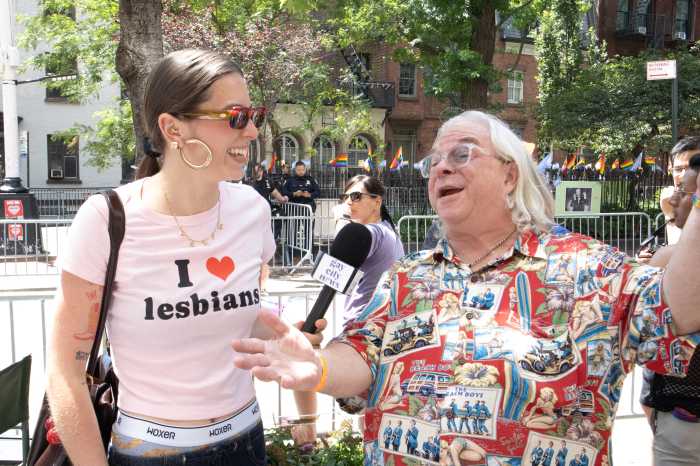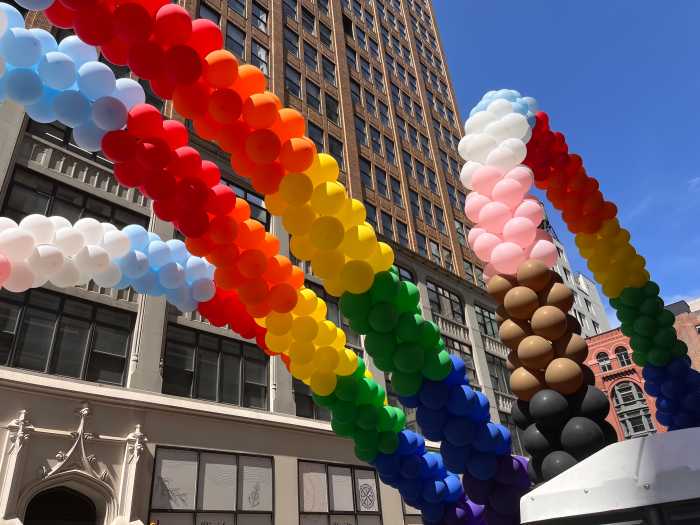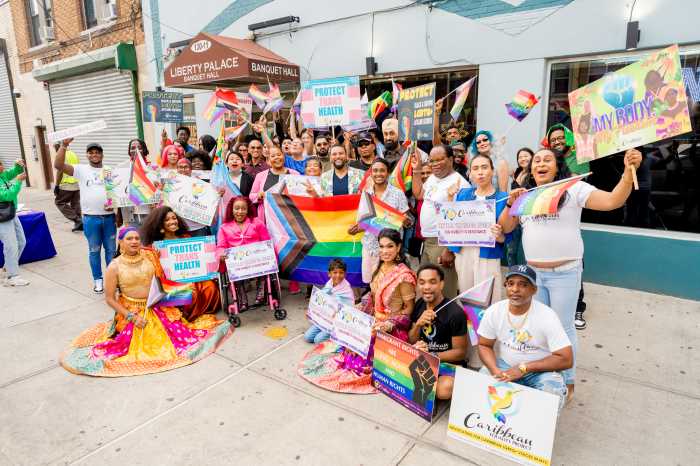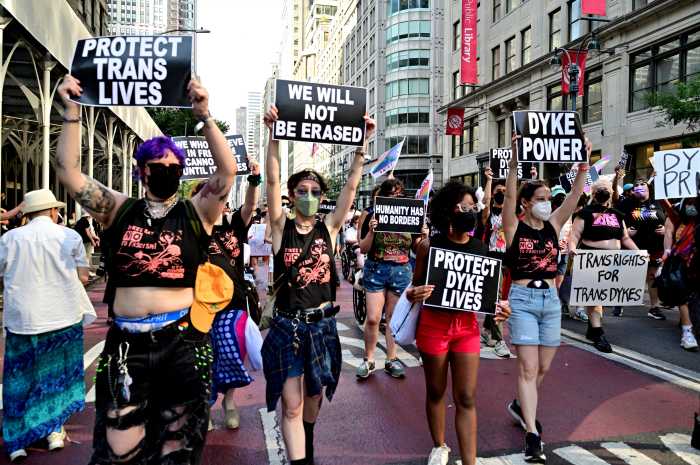Gay men face divergent fortunes in Iraq, but freedom is a relative term and an anonymous blessing. | MICHAEL T. LUONGO
BY MICHAEL T. LUONGO | Final In a Four-Part Series / A Perspective: “I push for this because of who I am. This hits me harder,” my friend from the US Embassy in Baghdad said about why the gay killings have so moved him, why he reached out to me when they peaked last year.
We were surrounded by men in shorts and Capris, tight tank tops on toned bodies, rainbow flags adorning every doorway. Clearly, we were not in Baghdad. It was Chelsea in the midst of New York’s 2009 Gay Pride Week. He was home on vacation, helping me strategize for my upcoming six-week trip.
Gay Americans obsess about Don’t Ask, Don’t Tell — and rightly so — but legions of gay civilians are in the war zones: in the State Department, the United Nations, non-profits from many nations, and even among the gun-toting contractors. Many of them work with gay and lesbian soldiers who are not officially out.
Gays and lesbians — especially thoes who are single and have no children — are the perfect war-zone demographic. The change we can enact behind closed doors on international LGBT issues has long been overlooked, but it’s part of the premise behind former State Department employee Mark Bromley’s group, the Council for Global Equality.
Looking at the issue of the gay killings in Iraq from San Francisco, London, or New York, it might seem that our embassy has done little or nothing. Though I firmly believe there was much more that the US could have done officially — after all, we have occupied the country for more than seven years — I also know that behind the scenes, unofficially, there have been people pushing for more.
I look at America’s occupation of Iraq like a Rudyard Kipling novel — many good people working in a bad colonial setting over which they have no control, reporting to people in capital cities thousands of miles away who have no clue about the reality on the ground.
I asked my friend what he thought could be done about the situation for gays in Iraq. Frustrated, he said, “Even if I could heli-vac all the gays out of Iraq, what about the Christians, what about the women, what about all the other persecuted people?”
The two of us were both well aware that gays are just one small part of the country’s refugee crisis. To put it in perspective, the 9,000 gay Iraqis in Damascus would nearly overload the official US quota system for the number of Iraqis our nation will accept in one year. There are many other persecuted groups and millions of displaced Iraqis.
I grew up in a neighborhood in New Jersey full of children whose grandparents were Holocaust survivors, most of whom were painfully aware of how the US immigration system at that time blocked the opportunity to save tens of thousands of persecuted Jews and other Europeans. Clearly the killings in Iraq are on a different scale from the Holocaust, but we cannot blame a mad dictator for those deaths. It is happening because the United States invaded Iraq, and still we refuse to change our quota system.
My Embassy friend would get angry at times, sensing what I was thinking.
“Journalists come in with an attitude that we should not have invaded,” he said. “We can’t go back in time. The argument that none of this would have happened if we hadn’t invaded means nothing anymore.”
This simplistic media attitude shuts down Embassy personnel, creating a defensive wall around them when dealing with reporters.
It’s true that the violence was unleashed by the power vacuum we created when we took out Saddam. A new power vacuum and a spike in violence — with a new government still waiting to be formed seven months after the latest election — are happening once again. But the question is no longer what should have been done — but what can be done.
My friend said that change must come from within Iraq.
“In a perfect world, the Iraqis would begin to protect their own people, gay people included,” he said, but then added, “The Iraqi government can say anything it wants, that it wants to protect gay people, but meanwhile there is a militia out there killing people.”
He offered a simple solution, telling me, “I suggest we have an expedited program working with other governments who can take more [refugees], using current NGOs [non-profit, non-governmental organizations]” working in Iraq.
this simplistic media attitude shuts down Embassy personnel, creating a defensive wall around them wIt’s an idea I’ve heard from others, a workaround to the US procedures that prioritize refugees who have worked with the US military, giving them SIVs, or Special Immigrant Visas.
The vast majority of gay Iraqis I know who are now in the United States are on SIVs or received asylum or refugee status for reasons other than being gay. My translator for the Gay City News article I wrote about my 2007 visit to Iraq, a gay Baghdad native, is a refugee because he had been kidnapped while working for a NGO. He wondered if being gay might expedite his case, but most people advising us felt it was a bad idea to add his sexual orientation to an already existing application. It might create confusion about his qualifications, leave him vulnerable to attack in Baghdad, or cause the US military, where he worked during the application process as a translator, to fire him. He also worried that coming out might mean his refugee caseworkers would stop helping him.
Gay refugee status is not so easy.
In March of this year, in New York, I met a young man who had once worked for the United Nations High Commissioner for Refugees (UNHCR). He talked about how seriously the UN took gay refugees. That may be so, but gay Iraqis I met in Syria were terrified of visiting Damascus’s UNHCR office. Simply being witnessed going there by Syria’s secret police was dangerous, let alone filling out paperwork admitting they were gay.
I met this former UNHCR worker at a talk given by Dr. Joseph Massad, a tenured Columbia University professor. In this lecture — attended by Scott Long, then the long-time director of the LGBT desk at Human Rights Watch, and Hossein Alizadeh of the International Gay and Lesbian Human Rights Commission (IGLHRC) — Massad made flippant remarks about gay Middle Eastern refugee and asylum cases, using the example of Jordan, his home country. Even gay students in attendance laughed.
Massad is controversial, but he is not alone in his lack of understanding about the seriousness and complexity of these issues; even LGBT activists who should know better show startling lapses and misjudgments. One from San Francisco posted pictures of a gay Iraqi asylum seeker whom he did not like on his website, giving his full name. That’s the sort of thing that could lead to the machine-gunning of this man’s entire family in Baghdad.
I want to make something perfectly clear. While activists and others in London, San Francisco, and New York argue, make jokes, or simply treat gay Iraqis as trendy cocktail banter, real men have been dying in Baghdad.
I am a journalist, not an activist, but if I am going to risk my life writing about something, I’ll choose a topic I hold close to my heart, hoping to at least bite out bits of the truth — even if what results remains messy, murky, and sometimes false in its own way.
In fact, there are many truths, especially in a place like Iraq. In a tale of two cities for gay Iraqi men, there is more than one Baghdad — at times deadly and dangerous, with blood-splattered, frightened men bearing witness to the deaths of their friends; at other times, for some men, posing no problems at all, even offering a fragile return to joyous adventures along the banks of the Tigris.
My biggest surprise was discovering the Arabic version of my book “Gay Travels in the Muslim World” for sale in Baghdad. How can that be so? Wouldn’t simply buying the book mark someone for death?
Only by directly witnessing and inhabiting spaces in Baghdad can some sense at all be made of the confusion — the deaths along with the revival of gay life; the horrific posture of the Iraqi government and the seeming inaction of foreign governments.
After having visited Iraq and seen the randomness of the violence firsthand, the disconnect in our attitudes here in the US angers me the most. After reading four installments of my reporting about Baghdad and the dangers gay men face there and beyond — roughly 16,000 words, including part 1, part 2, and part 3 — what are you going to do about it? And where does all this fit into the broader crisis facing gay men and lesbians around the developing world, such as in Africa, a new frontier of anti-LGBT violence?
It’s easy to sit in the comfort of one’s home, after watching “The A-List” or “Dancing With the Stars” or the latest escapades of Lindsay Lohan, and say, “Oh, I care about gay Iraqis!” But how is that abstract, touchy-feely thought put into practice?
It’s true that when I tell other gay men I am writing about gay Iraqis, they often ask me what they can do, some with the utmost sincerity. If you’re one of them, well, here’s an answer.
Are you willing to write letters to members of Congress and to the State Department, provide money to groups like Human Rights Watch, IGLHRC, the London-based Iraqi LGBT, the Organization of Women’s Freedom in Iraq, the List Project, the International Organization for Migration (IOM), or the International Rescue Committee (IRC)?
How much does seeking asylum or refugee status even cost? To give you an idea, when Human Rights Watch (HRW) helped gay Iraqis flee to another country, they needed a few thousand dollars for each individual to cover flights and other incidental expenses. One of the men they helped told me he could not legally work in his temporary host country and it would take up to a year for his refugee paperwork to be processed. He paid $250 rent for an apartment out of a monthly $400 stipend HRW provided, which was due to run out shortly after I interviewed him in February — long before he would officially be granted refugee status.
Multiply the costs borne by this man by so many months and so many other gay men, and you recognize the exorbitant bill that the warm and fuzzy notion of saving lives means for a group like HRW, even without considering the staff salaries it takes for it do this work in the first place.
Ali Hili’s Iraqi LGBT group pays rent on safe houses, with some of the money raised no doubt going to pay bribes to corrupt Iraqi police, something there is no official budgetary line for. And once that rare refugee or asylum seeker reaches the US, he’s usually not allowed to legally work for up to a year. What is the cost of housing this person? And where does that money come from?
In spite of the enormous, even bankrupting sums of money spent on the military and government contractors in occupied Iraq, the US government and NGOs, both American and foreign, put very little money into asylum and refugee work. When my translator came here as a refugee, he received a free bed, a free chest of drawers, and three monthly stipends of about $400 each. That amounts to a total of $1,200 to live in New York City, with no legal right to work for 12 months at least.
This is what we give a refugee from the country we invaded. And he was someone lucky enough to have been allowed to come here.
So if you really are concerned about gay Iraqi refugees, how about putting your money where your mouth is and opening your home to one? Can you feed him, clothe him, and explain a new culture to him? Help him get a job in the worst economy since the Depression? And do this for as long as a year?
It is not so easy.
In the Broadway play “Time Stands Still,” about the relationship between a journalist and a photographer returning from Iraq, Mandy, a seemingly vapid character who knows the couple, complains about having to read about the horrors of the Iraq war.
She asks, “What do I do with this information?”
Is it a silly question — or one that makes perfect sense in the case of a war to which few Americans seem to have any connection and or even think about at all?
After reading this four part series on gays in Iraq, Mandy’s question is the one you should ask yourself.



































